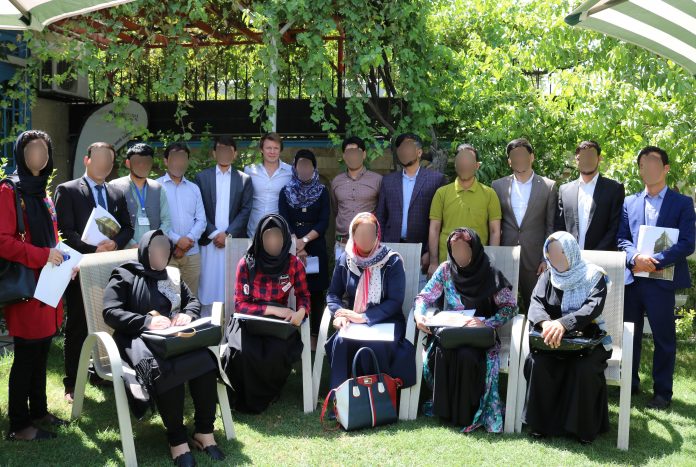Joseph Seaton, who has spent more than 20 years working on education and development programmes, and is now campaigning through #AtRiskTeachers, shares his concerns about the teachers left behind in Afghanistan
Over 100 former British Council (BC) teachers continue to live in hiding in Afghanistan, almost a year and a half after the country fell to the Taliban. The teachers worked on various UK Government-funded BC programmes and delivered teacher training, English lessons and classes on UK values (Including equality, diversity & Inclusion [EDI]). Since the Taliban seized power, the teachers have been living in fear for their lives, with many receiving threats and some becoming victims of Taliban violence.
Many of teachers worked for the BC for a considerable period of time, some for 10 years. They all had rolling contracts with the organisation, which were renewed on an annual basis. Yet thus far, their long service and commitment to the Council has remained largely unrecognised. Even though they were all eligible for relocation under the UK Government’s relocation scheme, only three teachers got out.
The BC knew well in advance of the collapse of Afghanistan that they were closing their office in Kabul. In early 2021, all the BC managerial and administrative staff who worked in the office in the British Embassy compound were informed of the UK Government’s Afghan Relocation & Assistance Programme (ARAP). The Council advised them on how to complete their applications and had their names added to a list submitted to the ARAP approvals team.
According to the left-behind teachers, the BC did not inform them about the scheme,
“Former colleagues started to contact me begging for help”
nor advise them on how to complete their applications, and their names were not added to the list.
This initial failure to include all but three teachers in the ARAP scheme is very surprising, as all the teachers met the criteria. Of all the BC employees, the teachers were the most recognisable and exposed, as they were public-facing employees, well known within their local communities. Everyone knew they ‘worked for the British’. While some members of their local communities may have seen this as a sign of success, others might be more suspicious, seeing collaboration with the UK and the West as a betrayal. Also prevalent in Afghanistan is the idea that people ‘working for the British’ are spies or traitors.
As well as the mistrust, there is the ongoing rejection of Western values in some quarters, evidenced by two Taliban attacks on British Council premises in Afghanistan. The 2011 attack on the BC office in Kabul resulted in 17 fatalities and prompted the Council to move their office onto the British Embassy compound. A further attack on a British Council English Resource Centre in Kandahar in 2015 points to the continued feelings of animosity towards the organisation.
Aware of the risk to former BC employees, the British Council managers and office staff were all included in the ARAP scheme from the start – and rightly so. They all worked for the BC and qualified for the ARAP scheme according to the UK Government’s guidelines. What is baffling to me is that all but three of the teachers were excluded.
The teachers had all worked on UK Government-funded programmes. Around 50 of them had been employed on the ‘English for Afghans’ programme launched in 2017 and funded by a £4.5 million grant from the Department for International Development (DfiD). As part of my work in Afghanistan, I was tasked with writing the proposal for this programme.
In order to qualify for the funding, the programme had to contribute to the UK foreign policy objective of Countering Violent Extremism (CVE). To ensure this, we were instructed to include not only English teaching and teacher-training strands, but also a UK Values component focusing on EDI. As well as this, there were specific programmes dedicated to Government and religious officials (‘English for Civil Servants’ and ‘English for Religious Leaders’). The EDI component, coupled with the Civil Servants & Religious Leaders programmes allowed us to confidently state that our programme would contribute to creating a more secure and stable Afghanistan.
DfID were happy that the programme would contribute to CVE and so gave us the £4.5 million. This is important, because the teachers left behind were the very people who delivered these programmes on the ground. They were the publicly recognisable people working in the community and delivering modules on EDI to a wary and conservative Afghan population. Programmes which contribute to a more secure and stable Afghanistan sound great, but in my opinion to then fail to protect the people who delivered these programmes sends a very poor message.
I first started to hear from former colleagues in mid-2021. Although I had worked at the BC office in Kabul for almost four years (2016- 2020), I had been gone over a year and was surprised when former colleagues started to contact me begging for help.
My initial response was to encourage them to pursue their inquiries through the BC. I felt sure they would assist their teachers in getting fair treatment. However, In early August 2021, I was told that the UK Government had decided to exclude all contractors from the ARAP scheme and this included the teachers.
As the country unravelled, I started to collaborate with the BC more, providing lists of former teachers (as they did not have these) and urged them to communicate with their former teachers – all of whom were desperate to get out. After the Taliban took full control, the airport closed and the country shut down. Those teachers who had received ARAP rejections reapplied. These re-applications were again rejected or remained unanswered.
In January 2022, the BC emailed the teachers to advise them that they were to await the launch of the Afghan Citizens Relocation Scheme (ACRS). The teachers duly waited, then all submitted their ACRS Expressions of Interest when the scheme launched in June 2022. While almost all have now been confirmed as eligible, no cases have progressed, no teachers have been relocated and they all continue to live in hiding.
Having trained, managed and worked alongside these teachers, I am very disappointed to see how they have been treated by Britain. As highly competent teachers, passionate about their work and the development of their country, they really deserved better. They are at risk as a direct result of what we recruited them to do for us, yet so far we have failed to ensure their safety.
There has been progress since 2021. Back then teachers were routinely rejected for ARAP. They have almost all now been confirmed as eligible for ACRS, but the dangerous wait goes on. So far, Rishi Sunak’s Government has failed to take action. I started the At Risk Teachers campaign in 2021, in an effort to maintain public awareness and keep the issue in the minds of the BC, politicians and the media. I have since written to and tweeted three UK prime ministers, three foreign secretaries and three home secretaries, but at present, all the teachers remain in Afghanistan.
Politicians again raised the issue in the House of Commons on 12th December 2022 and the teachers continue to hope that the Government chooses to be accountable in the near future.
Right now, the former BC teachers endure another harsh Afghan winter as they hide out. The irony remains that they were tasked with teaching inclusion, then were excluded from a relocation scheme they all met the criteria for. Let’s hope they get fair treatment soon.
British Council response
When the ARAP scheme first opened in April 2021, the UK Government only considered applications from British Council employees. This category included our office staff, but not our contractors (which included our teachers).
In August 2021, the UK Government extended the criteria of the scheme, which meant our contractors became eligible.
We contacted our contractors at this point, including the teachers, and encouraged them to urgently apply. We maintained regular contact and provided detailed information, support and updates throughout this time on the application process, including contacting the Foreign Commonwealth and Diplomatic Office and the Ministry of Defence.
We provided comprehensive lists with the names of all known applicants to the ARAP scheme in August 2021, including the names of these teachers, and provided the regular updates to those lists thereafter.
We set up and staffed a dedicated inbox, which we’ve maintained since, expressly to maintain contact with contractors. Numerous former contractors communicated how valuable our communications were.
Gazette comment
In our invitation to the British Council to respond, we specifically asked them under what legal definition these teachers were ‘contractors’ and sent a copy of the 2007 Afghan Labour Code. They did not address the matter.
The term contractor is not mentioned in the ARAP criteria, though the terms ‘locally employed staff’ and ‘directly paid’ are.
There appears to be no question that the teachers were indeed directly paid, but were they employed? Under which legal system should the status of employee be decided? In this case it would be the Afghan Labour Code.
So the term employee in the ARAP guidance should cover anyone who, under Afghan law, is an employee and not a contractor. The Dari term translated as contractor has several meanings. In the 1999 Afghan Labour Code, for example, contractor is defined as an employee on a fixed-term contract.
Mention has also been made of the teachers being employed on a ‘service contract’. Such a contract is described in the 2007 Afghan Labour code as ‘a written agreement entered into by the employee and the employer”. It also applies to employees, specifically including teachers, working on fixed-term rolling contracts and gives them the same legal rights as other staff.
Under Article 7, the same law states ‘Persons working in international and foreign organizations in Afghanistan have to obey the provisions of this law’.
Even under English law, the term contractor does not seem to apply. Since 2017, public bodies in the UK can no longer claim as a contractor anyone who:
- has to carry out the work themselves and cannot send a substitute;
- is paid by time and not project;
- is closely supervised by the body’s own staff;
- is provided with equipment by that body and/or works at their premises;
- does not have their own business identity;
- cannot decide how and when to work.
The Gazette again invites the British Council to explain the legal grounds on which their teachers are considered contractors.

Joseph Seaton has been a teacher, teacher trainer and programme manager for many years. From 2016-2020 he was English Manager & Deputy Director at British Council Afghanistan. Since the Taliban took power he has been running the At Risk Teachers campaign.





